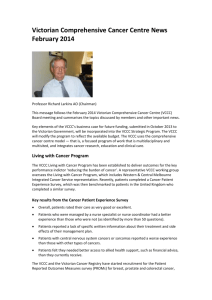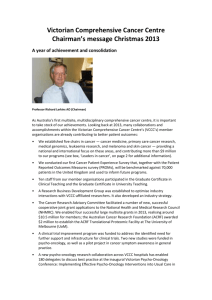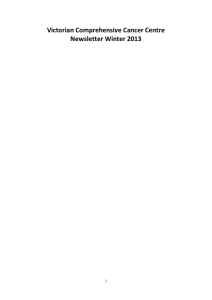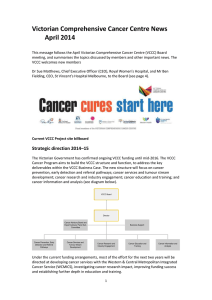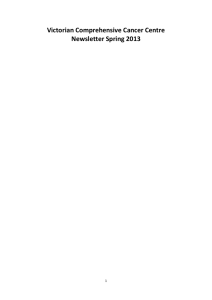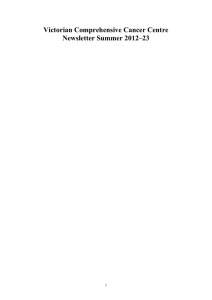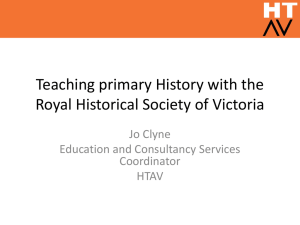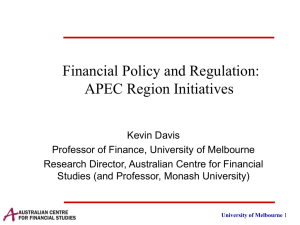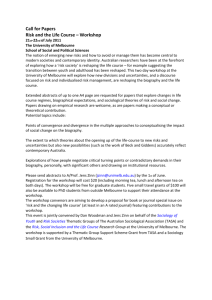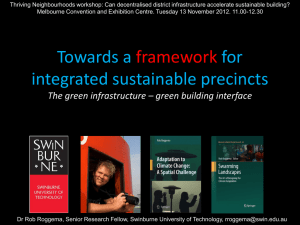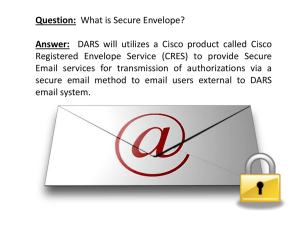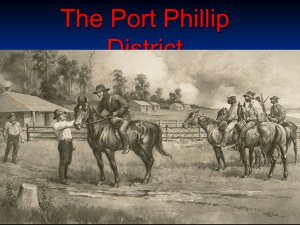Living with Cancer Program — VCCC cancer patient experience
advertisement
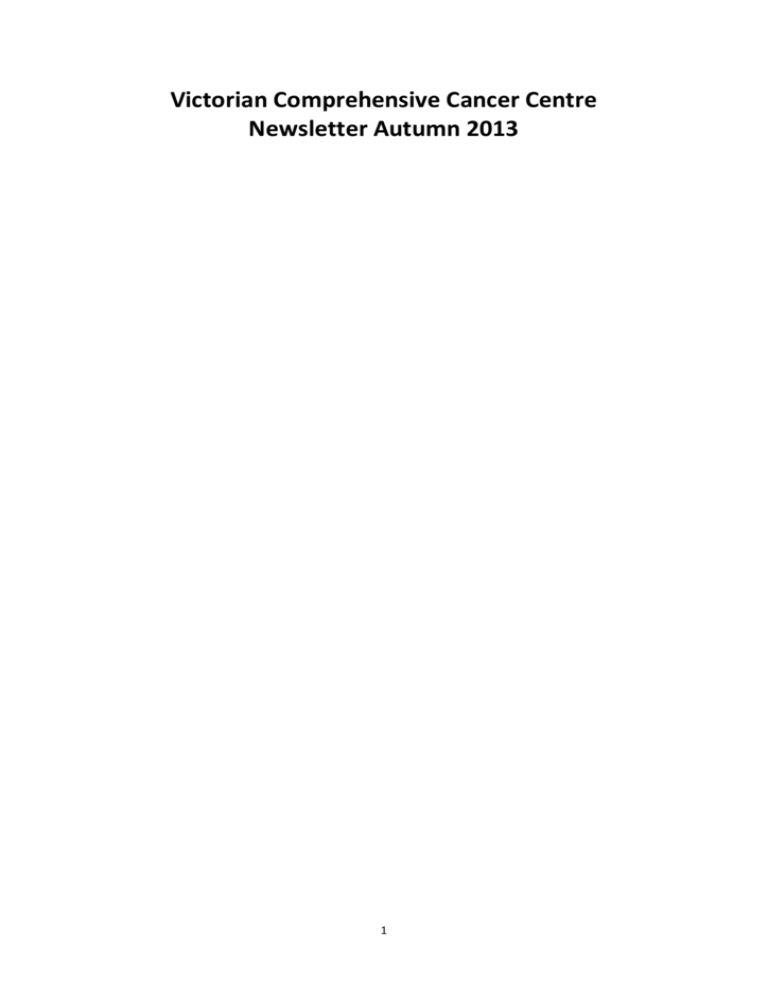
Victorian Comprehensive Cancer Centre Newsletter Autumn 2013 1 In this issue Chairman and Executive Director’s message ................................................................................. 3 Research Finds Cancer Cures ........................................................................................................ 5 Building a Centre for Excellence in Cancer Education and Training ................................................. 6 Building a Centre of Excellence in Cancer Research ....................................................................... 8 Building a Centre of Excellence in Clinical Care .............................................................................. 9 VCCC industry strategic engagement plan ................................................................................... 11 Living with Cancer Program — VCCC cancer patient experience survey ........................................ 12 IM & ICT progress ...................................................................................................................... 13 Project update ........................................................................................................................... 13 Upcoming events ....................................................................................................................... 16 2 Chairman and Executive Director’s message Professor Richard Larkins AO (Chairman) Professor Jim Bishop AO (Executive Director) The Victorian Comprehensive Cancer Centre (VCCC) has developed a number of baseline measures to monitor progress against our strategic plan to accelerate the improvement in cancer outcomes in Victoria. Living with Cancer Program Under the Living with Cancer Program, we have initiated a cancer patient experience survey to track progress in future years. The survey is based on that used in the United Kingdom (UK) and will allow us to benchmark against the UK as a whole, and against UK institutions specifically. The study on patient reported outcome measures will also enable benchmarking and document patient quality of life. Leaders in Cancer The agreed VCCC strategy to develop, retain and recruit Leaders in Cancer to the centre is well underway. Progress so far in the Leaders in Cancer Program includes: • Professor Jim Bishop was appointed as Herman Chair of Cancer Medicine, The University of Melbourne 3 • Professor Jon Emery, in an Australian first, was appointed the Herman Chair of Primary Care Cancer Research to Western Health, VCCC and The University of Melbourne • Professor Graham Taylor was appointed as the new Chair of Medical Genomics, The University of Melbourne • the Metcalf Chair of Leukaemia Research was established • the Lorenzo Galli Chair of Melanoma and Skin Cancer was established • the Julie Borschmann Fellowship in Myeloma was established • four Herman Clinical Research Fellowships were offered • academic recruitment for molecular epidemiology is underway • the Herman Chair in Health Services Research is being developed • chairs in palliative care, surgery and cancer nursing are being developed. Excellence in Cancer Research, Clinical Care and Education Under the three program areas — Building a Centre for Excellence in Cancer in Research, Clinical Care and Education — the VCCC has audited clinical activity, research performance and education activity to complete a series of baseline measures. The latest research census has captured activity from the past two years that will enable researchers to understand their own strengths, where key collaborations can develop and what capabilities should be built. The impact of research was examined through a publications analysis of all the world’s cancer publications from 2006 to 2012. On average, the VCCC ranked 17th in the world for publication impact, but 6th in the world for the number of top 10% publications by impact. A clinical audit has reported on about 1.7 million occasions of care for 110 000 patients with cancer in the past five years from VCCC member hospitals. Analyses on cancer types, their distribution and costs will be completed shortly. Preliminary data shows areas of strength in most types of cancer, including lymphoma, head and neck cancer, brain tumours, bowel cancer and sarcomas. This audit is being used to identify cost-effective models of care and to inform service planning by providing a full understanding of cancer-patient distribution and services capability. In addition, we have started a project of key reforms to increase accrual rates on clinical trials. It has been agreed there will be a new call for those needing funding to support the establishment of tumour-specific symposia. Change management The VCCC Change Management Committee is currently developing a series of steps to prepare staff for the proposed changes involved in the move to the new facility and other activities of the VCCC. A new Change Management Committee, under the Department of Health Project Steering Committee, has been formed and is chaired by Professor Robert Thomas. Professor Richard Larkins AO VCCC Board Chair Professor Jim Bishop AO Executive Director 4 Research Finds Cancer Cures At the recent VCCC Board meeting, chief executive officers of the alliance members agreed to a joint positioning approach focusing on research to highlight the VCCC’s collaborative vision. A billboard showing the new message — Research Finds Cancer Cures — was erected in midMay at the Project site and promotes research across the VCCC. The message positions the campus and the broader alliance as leaders in cancer research and is a key mission for the VCCC. ‘The Research Finds Cancer Cures message epitomises the philosophy of the partnership of organisations making up the Victorian Comprehensive Cancer Centre’, says Professor Bishop, VCCC Executive Director. ‘Passing traffic will be exposed to this aspirational key message at the VCCC Project site, reflecting the collaborative work that is already underway across the alliance’. 5 Building a Centre for Excellence in Cancer Education and Training Excellence in Cancer Research The VCCC, together with the Picchi Brothers Foundation, held a ceremony on 13 March 2013 at University House @ Woodward to recognise the recipient of the inaugural Picchi Award for Excellence in Cancer Research and the VCCC Student Career Development Awards. Recipients of the VCCC career development awards included Annette Lim (Peter MacCallum Cancer Centre), Anna Boltong (Peter MacCallum Cancer Centre), Connie Duong (Peter MacCallum Cancer Centre), Nikhil Sapre (Royal Melbourne Hospital) and Lorey Smith (Peter MacCallum Cancer Centre). Dr Aung Ko Win from the Melbourne School of Population Health was awarded the top prize, the Picchi Award for Excellence in Cancer Research. During the event, Picchi Brothers Foundation Board members, clinicians, supervisors, researchers and students gathered to hear Dr Win present a summary of his research findings on developing a prediction model for colorectal cancer, a disease in which different genetic mutations are responsible for the development of different cancer subtypes in various regions of the bowel. After completing his medical degree in Burma, Dr Win studied a Masters of Public Health at The University of Melbourne before starting his PhD. As a young researcher, he has already made a substantial contribution to knowledge in his field — knowledge that has the ability for immediate translation into clinical practice. His work provides the best evidence to date that breast cancer is a part of Lynch syndrome, and he has provided the first authoritative evidence that noncarriers of mutations in families with Lynch syndrome do not have an increased risk of bowel cancer, allowing doctors to release these individuals safely from costly and invasive colonoscopy. Dr Win’s PhD supervisor, Associate Professor Mark Jenkins, said, ‘In my many years of academic research, never before have I had the good fortune to witness someone as productive and of such promise this early in his or her career. ‘Because of his work, eminent cancer and genetics researchers at internationally renowned institutions now see The University of Melbourne’s Centre for Molecular, Environmental, Genetic and Analytical Epidemiology as being a world-class contributor to epidemiological research into the genetics of cancer. ‘He has answered a clinically difficult question in colon cancer research, in providing information that carriers of the MUTYH gene mutation inherited from one parent are at increased risk of bowel cancer’. All recipients will use their award funds to travel, so they can present their doctoral research findings to the international scientific and clinical communities in 2013. 6 Caption: Recipients of the VCCC career development awards included Lorey Smith (Peter MacCallum Cancer Centre), Connie Duong (Peter Mac), Annette Lim (Peter Mac), Anna Boltong (Peter Mac), Aung Ko Win (University of Melbourne), Nikhil Sapre (in absentia) 7 Building a Centre of Excellence in Cancer Research Research census update The 2013 electronic research census opened to researchers in March. A number of researchers completed the census early and gave excellent feedback that enabled the e-tool to be improved significantly, benefitting all groups that had not yet completed the online census. After a short period of reprogramming during which the census was closed, the etool reopened for a further two weeks to allow completion. Additional changes will be made so that any future census will be more user friendly. Although it has taken a fair amount of effort for each group to complete, the data will be stored so that basic information will not need to be re-entered. The information is also used to report to government on VCCC key performance indicators, and to form the basis for program development and external funding submissions. For example, the last census indicated that nearly three-quarters of the VCCC organisations’ cancer income came from government sources (see graph). The census information also enables us to identify the types of sources that are not being used adequately, such as commercial and philanthropic funding sources. Researchers indicated that there were areas in which they lacked expertise and/or access to infrastructure. We acknowledged those areas and are currently building on them to improve the conditions for all VCCC researchers. Why do a research census? The results of the previous census showed the significant contribution that the VCCC member organisations make to the cancer control effort across Australia and around the world. Each organisation will receive its own data back in a comprehensive report to share with all staff. The information collected will become a useful tool for all researchers and can be used in grant writing to demonstrate the strength of the VCCC alliance, as well as in setting up specialist groups in tumour streams or disciplines. For any VCCC research census queries please contact Rebecca Lennon, VCCC Project Manager, via email rlennon@unimelb.edu.au or telephone (03) 9035 4677. 8 Building a Centre of Excellence in Clinical Care VCCC clinical audit — field work Important information on cancer outpatient data, patient flows, referral patterns and multidiscipline team meetings will form the basis of additional work on the VCCC clinical audit. Our summer 2012–13 newsletter contained a story about the audit undertaken by Professor Danny Liew and his team. In addition to that analysis of the administrative data, which largely captured inpatient information, Healthcare Management Advisors (HMA) will soon be on the ground in the six VCCC clinical organisations: Peter MacCallum Cancer Centre, Melbourne Health (including The Royal Melbourne Hospital), The Royal Women’s Hospital, The Royal Children’s Hospital, Western Health and St Vincent’s Hospital Melbourne. This group have been tasked with filling some of the gaps in the administrative data. Building an integrated cancer service begins with understanding patient demographics and the environment in which patients are treated. The information collected will be used to map, in detail, all clinical activity across the VCCC, which no other organisation or alliance of organisations has seen before. The data will form the basis for future cancer planning across the VCCC and guide decisions on cancer programs that benefit all of the VCCC members. It will also be provided back to each organisation to use in building capacity and strengthening gap areas that are currently unidentified. HMA will soon contact the people at each VCCC member organisation who have first-hand information, particularly with regard to outpatient activity. If you consider yourself to be the holder of important information that can add to the body of knowledge for your organisation and that of the VCCC as a whole and you don’t receive a phone call or email from HMA by 21 June, please contact Fiona Macken at the VCCC via email fiona.macken@unimelb.edu.au or telephone (03) 9035 8170 to ensure your cancer clinical activity is included in the VCCC’s overall map. Clinical trials consultation The previous VCCC research census (2008–10) highlighted that infrastructure and access to expertise was limiting researchers’ ability to expand the high-quality cancer clinical trials program across the VCCC. In response, the VCCC’s Cancer Research Advisory Committee set up a Clinical Trials Working Group, which commissioned Cancer Trials Australia (CTA) to explore the issues further. For the past eight months, the VCCC has worked closely with CTA to ensure that a wide consultation of clinical trials staff had a say in the priority areas they wish to see improved with regard to either supporting infrastructure or the enhancement of the existing Phase I clinical trials program. CTA also engaged HMA to undertake part of this consultative work, and completed approximately 100 interviews across the VCCC. Under the VCCC’s Cancer Research Advisory Committee, the Clinical Trials Working Group prioritised areas that will now be addressed through targeted actions. 9 For further information please contact either Nathalie Johnston at CTA via email Nathalie.Johnson@ctaust.org or telephone (03) 9342 7306, or Rebecca Lennon at the VCCC via email rlennon@unimelb.edu.au or telephone (03) 9035 4677. Psycho-oncology research funding The VCCC recently conducted a new funding scheme, worth up to $100 000, in the area of psycho-oncology research. The research supported is expected to be innovative and evidence based, and will ultimately produce credible new evidence to move the psychooncology field forward. It is expected that this initial grant will encourage applications for sustainable research funding in the future. Applications were open only to VCCC member organisations, and proposals were requested to take a collaborative approach by including as many VCCC member organisations as possible. Furthermore, research proposals that were inclusive of multiple tumour streams and had the potential to lead to ongoing, long-term change in psycho-oncology were viewed as favourable. The closing date for submissions was 17 May. An expert panel is currently evaluating the applications, and outcomes will be released in June. For information regarding the outcomes of the psycho-oncology research funding, please contact Fiona Macken at the VCCC on fiona.macken@unimelb.edu.au or (03) 9035 8170. 10 VCCC industry strategic engagement plan The VCCC presents the opportunity for its members to attract new sources of funding collectively, which may not be available to the members individually. There is the potential to expand opportunities for VCCC members to maximise the value of their partnerships with industry by engaging collectively, while using combinations of individual member strengths to contribute to specific projects. The VCCC has set up a Research Business Development Steering Committee that has identified the need for proactive promotion of specific research opportunities to companies with relevant interests. Greg Leong, with experience working at several VCCC members, has been engaged to draw up a strategic engagement plan for industry. During the coming months, Greg will be engaging with VCCC research leaders, to identify research programs common across the VCCC members where there is significant research and clinical capability that would be attractive to potential industry partners. 11 Living with Cancer Program — VCCC cancer patient experience survey Information from patients will be used to drive quality-improvement initiatives and better models of clinical care following a new cancer patient experience survey conducted by the VCCC. This quality-assurance activity is part of the VCCC’s commitment to reduce the burden of cancer and ensure patient needs are met. The National Health Service (NHS) in the UK kindly granted permission for the VCCC to use their cancer patient experience questionnaire for our survey. The NHS questionnaire is cancer specific and spans the care trajectory, from diagnosis and treatment through to follow-up care. The questionnaire was developed with oversight from the UK Cancer Patients Experience Advisory Group, which is co-chaired by the National Cancer Director Professor Sir Mike Richards and Professor Jessica Corner of Macmillan Cancer Support. The questionnaire has undergone significant cognitive testing in the UK by volunteers from Macmillan Cancer Support, with input from a cancer advisory group. Fieldwork for the VCCC survey started in April 2013. A questionnaire was sent to all eligible patients who were seen between October and December 2012 for their cancer in one of the following VCCC clinical sites: Melbourne Health, The Royal Women’s Hospital, Peter Mac, Western Health and St Vincent’s Hospital Melbourne. It is anticipated that the results of the survey will be published by the middle of this year. An aggregate VCCC report will be produced, as well as bespoke reports for each of the participating hospitals. It is hoped that the survey will be repeated on an annual basis to monitor the VCCC’s progress on improving outcomes in cancer patient experience. The survey has been made possible by the kind support of a dedicated working group, who have provided expert guidance and support throughout the entire survey process. Using patient-reported outcomes to measure cancer survivor’s quality of life The number of cancer survivors in Victoria is increasing, but little is known about the impact that cancer has on the everyday lives of survivors. Such information is important, as it can be used to inform future programs to ensure cancer survivors have a good quality of life following treatment. The VCCC is therefore planning to conduct a survey to assess the overall quality of life of cancer survivors in the VCCC with different cancer types and at different time points since diagnosis. Quality of life will be measured using patient-reported outcome measures (PROMs). The data elicited from the surveys will also be used to assess the contribution that demographics, and disease-related and other factors have on quality of life. Again, the NHS has granted permission for the VCCC to use their cancer PROMs questionnaires, which contain questions drawn from other validated quality-of-life survey instruments. It is hoped that, in the future, the VCCC will be able to benchmark its PROMs data with the UK and other comparable countries to understand how and why variances may occur, and identify opportunities for improvements. It is anticipated that this survey will be run in collaboration with the Victorian Cancer Registry later this year. 12 IM & ICT progress The VCCC Information Management (IM) and Information Communications Technology (ICT) team has now completed an exhaustive process of reviewing key documents created during the life of the VCCC Project. These documents included the VCCC functional brief, the business case, technical specifications and the IM & ICT investment plan. A comprehensive list of potential VCCC IM & ICT projects has been created. The information from both these processes has been used to collate a list of project priorities following input from the Cancer Information & Related Technology Steering Committee (CIRTSC) and other stakeholders, which will form the program of work for the IM & ICT team. For information contact: ask_ICT@victorianccc.org.au. 13 Project update The Hon. David Davis, MP (Victorian Minister for Health and Ageing) and the Hon. Tanya Plibersek, MP (Australian Minister for Health and Ageing) recently joined cancer survivors and people touched by cancer for a special site inspection of the new $1 billion VCCC Project facilities. Both ministers paid tribute to the VCCC Project consumer advisory groups who have provided invaluable advice on the design of the cancer centre. Members of the VCCC Project’s Consumer Strategic Advisory Group and the Consumer Design User Group (Heather Beanland, Nicola Bruce, Paul Baden, Kylie Lewis and Diane Frew) The VCCC Project construction continues to progress well. As can be seen from outside the hoarding, all four tower cranes that will be used in constructing the new facility have now been erected. Also visible from outside is one of the two elevator cores that will form part of the new facility. This core will climb to level seven. The second one (which is not visible from outside the site yet) will climb up to level fourteen. A tower crane will be erected on the north side in June, and structural steel works will start shortly thereafter. 14 15 Upcoming events The inaugural Victorian Psycho-Oncology Conference: Implementing Effective PsychoOncology Interventions into Usual Care will be held on 14 June 2013. Contact Karen Lacey at karen.lacey@unimelb.edu.au. Victorian Comprehensive Cancer Centre Ovarian Cancer Symposium August 5–7, 2013. Early bird registration and abstract submissions close 28 June 2013, regular registration closes 12 July 2013. Contact Karen Goulding at karen.goulding@thewomens.org.au Contact us Victorian Comprehensive Cancer Centre PO Box 2148, Royal Melbourne Hospital, Vic 3050 Level 3, 766 Elizabeth St, Melbourne, Vic 3000 telephone: +61 3 8344 8708 email: victorianccc-info@unimelb.edu.au Victorian Comprehensive Cancer Centre Ltd trading as Victorian Comprehensive Cancer Centre The Victorian Comprehensive Cancer Centre, a joint venture between: Peter Mac Melbourne Health The University of Melbourne The Royal Women’s Hospital Walter & Eliza Hall Institute of Medical Research The Royal Children’s Hospital Melbourne Western Health St Vincent’s Hospital Melbourne 16
